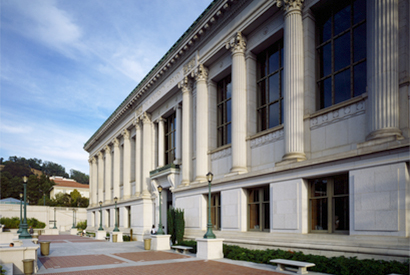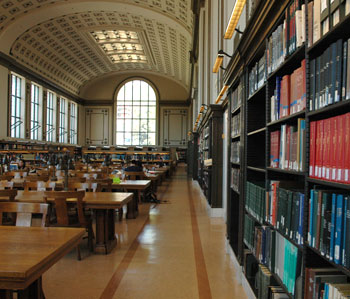At library’s research-advisory service, a specialist is ‘in’
A popular research-advisory service at Doe Library provides customized, one-on-one assistance to Berkeley undergrads during peak times each semester. For fall 2012 its dates are Sept. 24 through Nov. 21. Now, for the first time, students can make their appointments online.

September 26, 2012
Writing a research paper on the modern Korean film industry? invasive crayfish in Strawberry Creek? international trade between Brazil and China? intimidation of women in the American Revolution?
Setting out to tackle a meaty college research topic can be daunting, especially if you’re new to the campus or unfamiliar with its vast library and archival collections.

Doe Library’s North Reading Room houses a vast trove of reference books.
Luckily, a specialist is “in” at the research-advisory service — which offers customized, one-on-one assistance to Berkeley undergrads from Sept. 24 to Nov. 21 for the fall 2012 semester. And now, for the first time, students can make their appointments online — for a half-hour session with a research librarian.
Nearly 400 students annually, mostly in the social sciences and humanities, take advantage of this popular library service, which has been in place for a number of years.
“I was worried about how to start my assignment, but the librarian showed me very kindly, detailedly, where to start, ” one student wrote of the service. “Sometimes, one-to-one helps tremendously, compared to asking help in a group setting (due to peer pressure)…. I was able to ask all my questions.”
Convenience is the name of the game. Students come to Doe Library’s 2nd floor reference desk at their appointed time, meet a librarian already familiar with their project (as described in their online appointment form), and work together in a private consultation room, free of interruptions.
Because the librarian has advance knowledge of the topic, he or she will often “do a little bit of work in advance” to ferret out resources and thus streamline the meeting, says Lynn Jones, interim reference coordinator for Doe and Moffitt libraries. The goal is to “help students make research better and save them time,” she adds. “We don’t want them to spin their wheels; we know their time is really pressed.”
Often the library staffer will help a student narrow down a research topic to managable size, or “open a student’s eyes” to resources — a specialized government database, say, a campus subject-matter expert, the Melvyl catalog (which lists articles as well as books) or a useful tool for organizing citations and preparing a bibliography.
Although some discover a particularly useful book as a result of their meeting with a research librarian, that’s not typically “the major outcome,” notes Jones. Rather, “it’s very much an instructional session — to help make the student a more independent researcher, with many more tools and tricks” for conducting library research in the future.